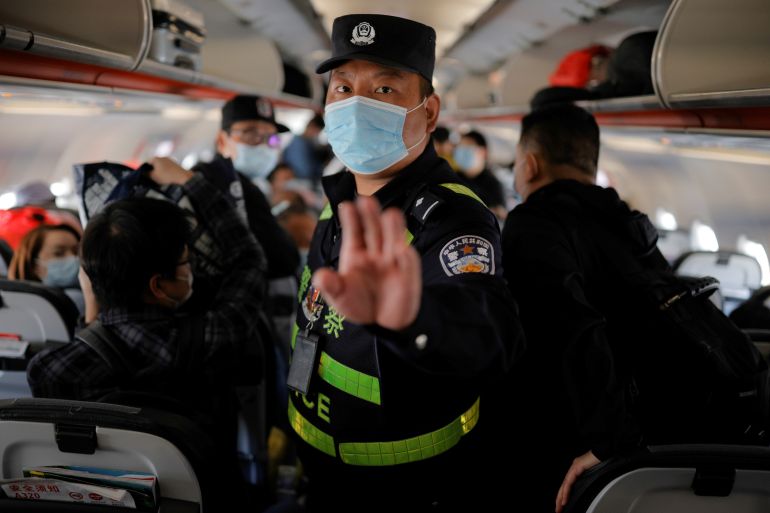China media freedom declining at ‘breakneck speed’: Report
Annual report from Foreign Correspondents Club says reporters face increasing harassment, a hostile public and legal threats.

As China prepares for the opening ceremony of the Winter Olympics, foreign journalists working in the country warn media freedom is declining at “breakneck speed”.
China has long been known for the challenging reporting conditions for foreign media, but journalists based there say they face an increasingly hostile public and new forms of intimidation including “online trolling, physical assaults, cyber hacking and visa denials”, according to the annual survey by the Foreign Correspondent’s Club of China, which was released on Monday.
Keep reading
list of 4 itemsChina is world’s ‘biggest jailer of journalists’, says RSF
UK expels Chinese spies posing as journalists: Report
‘Assumed as criminals’: Hong Kong defendants find bail elusive
The findings were based on a survey of 127 of the club’s 192 members.
The FCCC says much of this harassment takes place on Twitter, an app that is banned in China, indicating that it is most likely carried out with the approval of authorities.
The harassment has disproportionately targeted Chinese staff and female journalists of Asian descent, the report also said, and encouraged “a growing feeling among the Chinese public that foreign media are the enemy”.
Following deadly flooding in Henan province in July, a local Communist Party media account encouraged citizens to go out and report the location of a BBC journalist to authorities. The post led to the harassment of several foreign reporters, including German reporter Mathias Boelinger, who said he was surrounded by a group of older men who accused him of smearing China and was shouted at by others.
Journalists also report that legal threats have become an increasingly common form of intimidation, previously seen less in China than in other parts of the region such as Singapore and Thailand. Foreigners facing legal action can be barred from leaving the country, the report noted.
“The risk landscape is changing at the moment in unfamiliar ways. In particular, news organisations face warnings that their reporting may expose them to legal sanctions or civil lawsuits, or – most ominously – to national security investigations,” David Rennie, Beijing bureau chief for the Economist, said in the report.
“In the past, the main tools used to control media involved restrictions on access, blacklisting from events, or problems with press cards and visas,” he said. “The growing use of the law is new and worrying.”
Hong Kong, which used to be a bastion of media freedom in Asia, is now no longer seen as a viable base for the more than 20 foreign journalists who were expelled from China last year, fording many to report from places farther afield like Taiwan and South Korea.
The legal system in Hong Kong put journalists under pressure since China imposed a “national security law” in 2020. Since then, the law has been used to shut down and prosecute staff at two pro-democracy news outlets, while a third news outlet shut down at the start of 2022 citing “safety concerns”.
Foreign journalists say the continued shortage of staff working in China due to COVID-19 travel restrictions and expulsions has sharply curtailed the quality of reporting. Those who remain face an uncertain bureaucratic environment and delayed visas. More than 20 journalists reported receiving letters with provisional reporting rights in lieu of formal press cards, as well as shorter residency visas of just three months, the report said.
Some journalists said they voluntarily left China after they grew tired of restrictions as well as regular intimidation such as being followed by plainclothes security personnel.
Chinese staff working for foreign news outlets face some of the most difficult conditions, however, as they are regularly called in by authorities to report on their work and also face other forms of harassment.
Two Chinese journalists – Bloomberg staff member Haze Fan and Cheng Lei, an Australian who worked for state broadcaster CGTN – were detained more than a year ago by authorities and were initially thought to be living under “residential surveillance at a designated location”. RSDL gives police the right to detain anyone – foreign or Chinese – for up to six months at a designated location without disclosing their whereabouts.
Even as the world turns its attention to China ahead of the Olympics, the government has also not eased up on restrictions, the report added.
More than two-thirds of respondents told the FCCC they did not receive adequate information about what was happening, while a third said they were excluded from events open to other media.
Due to the intense travel and COVID-19 restrictions set for the event – reporters will be part of a ‘bubble’ involving only those attending the Games – the vast majority of foreign outlets have chosen to send reporters from abroad to cover the Olympics rather than assign full-time staff in China who might find themselves unable to work due to any sudden lockdowns.